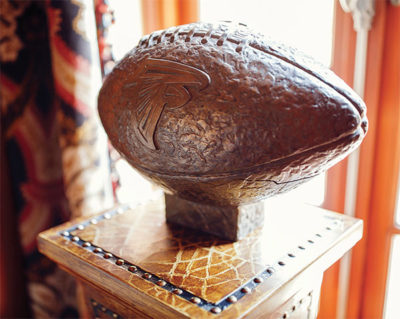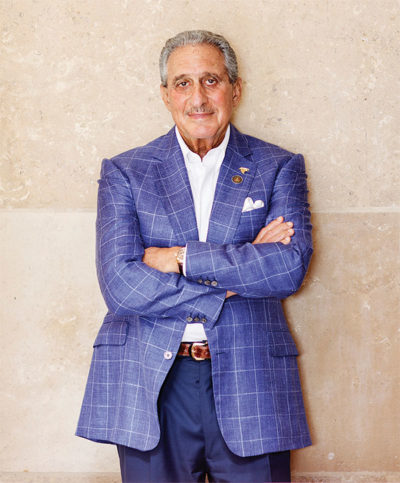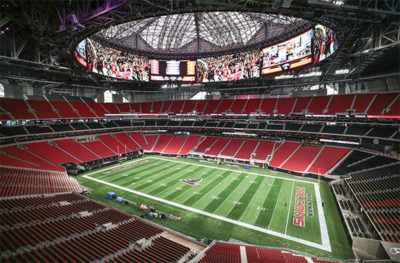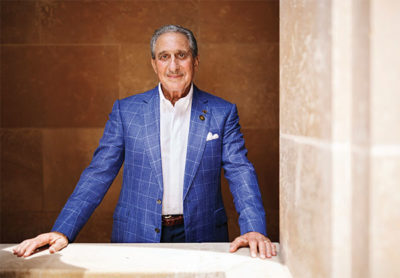
Arthur Blank ’63, H’98, likes to tell a story about the lion and the gazelle. It’s a tale he has told many times.
In Africa in the early mornings, so the story goes, the gazelle wakes up knowing one blunt truth: To survive, it must run faster than the lion. At the same time, the lion wakes up knowing an equally hard truth, that if it doesn’t run faster than the gazelle, it will have nothing to eat.
“Whether you’re a lion or a gazelle, you’ve got to get up and move in the morning,” Blank says, “so I’ve got to get up and move.” Blank is, indeed, a man in motion. Sixteen years have passed since he stepped away from Home Depot, the retail giant he co-founded, but the 75-year-old is far from retired.
Most visibly, he is the owner of the Atlanta Falcons football team. On any given Sunday, he can be seen sporting a touch of Falcons red and cheering on the players, even dancing with joy after a big win. Being an NFL owner has brought him both epic highs and lows. Last February, as millions watched on TV, the team lost a big lead and let a Super Bowl victory slip away. But this season has brought the opening of a dramatic new home for the Falcons, the $1.6 billion Mercedes-Benz Stadium, an immense and impressive structure that Blank calls “a dream come true.”
Blank has plenty to keep him busy outside of football as well. He’s the owner of the Atlanta United soccer team, two Montana ranches, and the PGA Tour Superstore, which has locations across the country. He also is dedicated to philanthropy, following the lead of Warren Buffett and Bill and Melinda Gates by signing the Giving Pledge, a commitment by billionaires to donate at least half of their wealth to charity. Blank has promised to give 95 percent of his estate to his family foundation.
“I have all the things I need and want and could use, so it’s an opportunity to make a difference,” he says. “You want to have meaning in your life in some form or fashion, and meaning for me comes from making a difference in others’ lives.”
Blank recently sat down with Babson Magazine to talk about his filled-to-the-brim life, about his experiences with the Falcons and what he hopes to accomplish through philanthropy, and about how family and a desire to serve others rejuvenate him and keep him moving, just like that lion and gazelle on the plains of Africa. “I am busy,” he says, “but it’s all good stuff.”
Always Pushing
The home base for Blank’s businesses and foundation is the Arthur M. Blank Family Office, located in Atlanta’s Buckhead neighborhood. With artwork and Falcons memorabilia lining its halls, the stately and expansive building houses a ballroom, a library stocked with books on leadership and philanthropy, and meeting rooms named for Anne Frank and Silent Spring author Rachel Carson. In the waiting area, visitors can view Home Depot mementos, including the company’s original business plan.
One striking aspect of the office is its sculptures honoring Native Americans. At the foot of the main staircase, for instance, stands a life-sized sculpture of a Teton Sioux warrior. Having spent much time out West on his ranches, Blank is inspired by the history and culture of Native Americans, of how they cherish family and respect nature. He also has come to admire the values of the Western ranchers and farmers he has met. “They have a much more simple view of life,” he says. “A handshake means everything. A promise means everything.”
Blank sits for an interview in a conference room off his private office. On the walls hang his honorary degree from Babson and a certificate marking his 1995 induction into the College’s Academy of Distinguished Entrepreneurs. A glass of Diet Coke by his side, Blank wears a blue sport coat and looks relaxed. “Anything you want to talk about is fine,” he says.
For Blank, the year started with the thrill of the Falcons going to the Super Bowl, their first trip to the championship game under his ownership, and then the agony of seeing the team blow a 28-3 lead. “We never should have lost the game,” Blank says. “There’s no question about that.” He doesn’t dwell on it. The team is still full of talent, and so he looks to the future and keeps the loss in perspective. “Things happen and you learn from them and you move on. I’m not going to let it become a weight around my neck for the rest of my life, that’s for sure,” he says. “I’ve achieved what I’ve wanted to achieve, which was to create a competitive, winning organization that’s going to be sustainable over time.”


 The stately and expansive Arthur M. Blank Family Office is filled with Atlanta Falcons mementos and art honoring Native Americans. The office’s library is stocked with books on philanthropy and leadership.
The stately and expansive Arthur M. Blank Family Office is filled with Atlanta Falcons mementos and art honoring Native Americans. The office’s library is stocked with books on philanthropy and leadership.
Lisa Chang, the senior vice president and chief human resources officer for Blank’s businesses, known collectively as the AMB Group, saw firsthand Blank’s attitude after the loss. “The day after the Super Bowl, we were on to the next thing,” she says. That didn’t surprise her. Blank is always encouraging his employees to keep trying, to keep moving. “There is no finish line” is one of his mantras. “Just when we think we got the cherry on top, he pushes us further,” Chang says.
Blank and the Falcons moved on in a big way from the Super Bowl with the opening of the 2-million-square-foot Mercedes-Benz Stadium, which also is home to the Atlanta United soccer team. “This is a very iconic and unique stadium,” says Blank, “probably the finest sports entertainment complex in the country today.” That may not be an exaggeration. When Blank and his team began the initial planning of the stadium about 10 years ago, the vision was to create something bold. Seating 71,000 fans for football games, it features a 58-foot-tall, 360-degree video board and a retractable roof with eight massive interlocking panels. For those feeling thirsty, the stadium has 1,200 beer taps.
In the weeks before the stadium opened, Blank focused on making sure it had a welcoming atmosphere for fans. The stadium employs a staff of 4,000, and Blank surprised newly hired ushers and concessionaires by showing up for their training sessions. “The grandeur of the building needs to be matched by the grandeur of our associate services,” Blank says. “We want our guests to feel like this is their home.”
A History of Building
Blank may have just built a stadium, but the first act of his career was spent building Home Depot, which he co-founded in 1978. When he stepped down from the ubiquitous home-improvement store in 2001, the company was the second largest retailer in the world after Walmart. “I had a wonderful 23 years,” Blank says, “and I was ready to do some other things.”
David Homrich, who has known Blank for 28 years, remembers the entrepreneur’s mindset as he left the company, with the possibility of new opportunities stretched before him. “In some respects, he was like a caged tiger,” Homrich says. “He wanted to run.” Homrich had served as Blank’s financial planner for 12 years before coming to work for him full time, and today he is the executive vice president, chief financial and investment officer of the AMB Group. The pair were having dinner together when Blank shared the news that he was leaving Home Depot. Homrich asked what the entrepreneur planned to do next. “I don’t know,” Blank replied, “but I know I’ll be active.”
A year later, Blank bought the Falcons, and since then he has found himself in the middle of the biggest spectacle in America: NFL football. Game days are filled with noise, cameras, and crowds, but Blank tries not to bother with all the pageantry. As an owner, he’ll socialize with sponsors, supporters, and officials at halftime and before the game, but during the game, he holes up with team executives and focuses on the field. He wants no distractions. “I’m an intense fan,” he says.
Before games, Blank also likes to visit with players on the field and in the locker room. “I try to spend a lot of time with our players, getting to know them, their families, their passions in life,” he says. When he chats with players, Blank aims to stay away from football talk. Because the average NFL career is only three years, he is concerned about their future plans. “They’re trying to figure out, ‘What do I do with the rest of my life?’” Blank says. “It’s hard.”

As the owner of a professional football team and soccer team, Arthur Blank believes in the power of sports to bring people together. “It’s a great venue for that,” he says. “You act as a catalyst for building community.”
While the Falcons’ head coach and general manager keep him informed about their strategies for the team, Blank gives them a wide berth. “I want to stay out of their way,” he says. “I don’t give any direction to any of our football staff on the draft, free agency, games, etc.” After games, he’ll meet with the coach for a debriefing, but not until the next day. “I don’t meet with him the day of the game, because it’s just too emotional, win or lose,” Blank says.
Beyond what happens on the field, Blank also focuses on the role that the Falcons play in the community. “It’s important for the team to give back, to win on the field and win off the field,” Blank says. “The expression we’ve always used is that there are two Super Bowls every year. The first is the one that you traditionally play on the field. The other is the Super Bowl of life. We want to win that one every year.”
The Art of Philanthropy
This drive to give back can be seen in Blank’s commitment to Atlanta’s Westside. An area plagued by poverty and high unemployment that lies next to the new stadium, the Westside once was home to civil rights leaders Julian Bond and Martin Luther King Jr. “Arthur said from the beginning that we could not have this iconic stadium on one side of Northside Drive and have these depressed neighborhoods on the other side,” says Penelope McPhee, president and director of the Arthur M. Blank Family Foundation. “We had to make a difference to the whole community.”

 Photos Courtesy of the AMB Group
Photos Courtesy of the AMB Group
Mercedes-Benz Stadium, the new home of the Atlanta Falcons, opened this football season. Costing $1.6 billion, the stadium features a uniquely designed retractable roof that employs eight massive interlocking panels.
To do that, Blank has invested millions in helping the Westside. As a deal to build the new stadium was finalized in 2013, the Blank Family Foundation pledged $15 million to the Westside Neighborhood Prosperity Fund, which invests in workforce development, education, housing, and other areas. This September, the foundation added another $15 million. The new stadium includes a 1.2-million-gallon underground vault to collect rain water, which helps alleviate flooding problems in the Westside. Other foundation initiatives, such as the Inspiring Spaces program that focuses on preserving and enhancing green spaces, have spent an additional $7 million on Westside activities. Plans in the near future include the creation of a neighborhood park on the site of the soon-to-be-demolished Georgia Dome.
All this investment has sparked corporations and other foundations to make their own donations to the Westside. “The vision has always been that we would be a catalyst, and others would invest with us,” McPhee says. The help is needed. Transforming neighborhoods and lifting people out of poverty isn’t easy. “It’s easier to build a stadium,” Blank says. “Changing people’s lives is a tougher row to hoe, but we’re working on it.”
Blank’s efforts in the Westside are just one part of his philanthropic aspirations. Since its founding in 1995, the Blank Family Foundation has contributed more than $300 million to organizations working in education, early childhood development, the environment, and the arts. That commitment will only grow with Blank’s signing of the Giving Pledge and his promise to donate the bulk of his money to the foundation. Contending that the “art of philanthropy, in many ways, is more difficult than the art of making money,” Blank spends considerable time evaluating nonprofits and figuring out the most effective programs to support.
Blank’s generosity extends to his alma mater as well. Through the years, he has sponsored scholarships, established an endowment to support the College’s entrepreneurship program, and funded Social Innovation Inventureships, which allow Babson students to tackle projects that make a social impact. The College left its mark on Blank, too. He remembers fondly his old professors, and he credits the campus offices he held for helping him grow as a leader. “Clearly, the education he received at Babson is in his DNA,” McPhee says. “He truly is, in the business area and in the philanthropic area, a serial entrepreneur. His vision is limitless. That reflects on the values of Arthur, but that also reflects on the values of Babson, too.”

Arthur Blank continues to find inspiration in his work and philanthropy. “Making a difference in the people we serve,” he says, “that’s what gives me the energy to do what I’m doing.”
All six of Blank’s children, including his youngest, twins who are 16, are involved in the family foundation to some degree. Spending as much time as he can with his family, which includes six grandchildren, is important to him. His wife, Angela, also has three children. In his conference room, a collage of family pictures fills the wall behind him. “I’ve got a lot of people to keep track of,” he says.
As busy as he is, Blank has taken some steps back from the day-to-day operations of his for-profit businesses, hiring a CEO in late 2015 for the AMB Group, though Blank continues as chairman and remains heavily involved in strategy. When asked if he has any plans to step aside fully, he states simply, “No.” He still has the drive to move, to plan, to act. “I probably always will,” he says.
